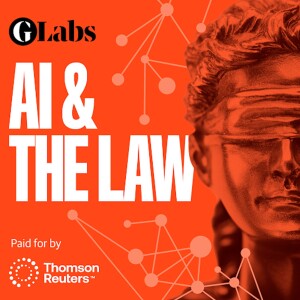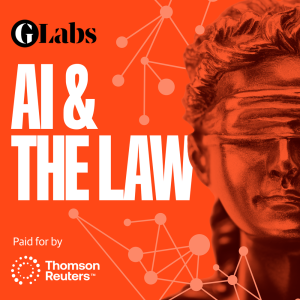AI & the Law
AI & the law unpacks the big issues confronting the legal profession as the sector, and other associated professional services, explore the potential opportunities of integrating generative AI into the workplace. Covering business and cultural shifts, workforce changes, and technical innovation, this mini series will answer the most pressing questions being asked by legal professionals around Australia.
Episodes

Wednesday Feb 26, 2025
Wednesday Feb 26, 2025
How are law firms benefiting from generative AI research tools?
Law firms have embraced AI-powered research tools. We take a look at how that’s going.
In this episode, we look inside a firm that has adopted generative AI in its legal practice. We examine the benefits the firm is getting from AI research tools, what is working well, how the firm has adapted its operations, and how new strategies are emerging through this legal technology.
Guests:
Daniel Knight - partner and member of the AI Solutions Group at global law firm, K&L Gates.
James Jarvis - vice-president of global legal solutions, Thomson Reuters.
In the past year the industry’s use of AI for research has moved from promise to practice. This episode digs into the reality of working with the assistance of generative AI research tools in daily legal workflows.
Daniel Knight brings us his perspective from K&L Gates, where he sits on the firm’s global AI solutions group, looking at how to unlock the potential of AI-powered tools.
“We see the possibility to do what we are already doing but to do it more efficiently,” he says. “Generative AI tools give us the opportunity to look at new services for our clients. It’s not just about saving time but unlocking new service offerings.”
Reflecting on his experiences working with generative AI research tools, Knight says they can help to round out a picture, adding additional context and colour that might not have been uncovered through traditional research methods. The “back and forth” of engaging with these tools also creates a more natural process for refining results, Knight says.
James Jarvis leads the development of Westlaw Precision Australia, an AI-powered legal research platform, at Thomson Reuters. He shares what he hears from the wider industry on conducting research using AI tools. He sees efficiency, accuracy and comprehensiveness as some of the key values on offer.
Jarvis says tools that allow lawyers to ask questions in a natural, straightforward way work best, “as long as the system can respond based on authoritative, accurate and relevant Australian legal information”.
He adds: “It’s the combination of rapidly advancing generative AI with Thomson Reuters’ authoritative Australia primary law collection, developed in responsible ways by our local subject matter experts, which makes our legal AI skills different and better from others which are hitting the market.”
Knight says: “We’ve always used tools to do our work and there have been advancements in the way we do that. Google was not an approach anyone used 20 years ago. Then it became a compulsory part of the toolkit. I think that’s where we’re heading with generative AI. What it looks like in six to 12 months is not yet known, but it’s an exciting space to watch.”
Credits:
The AI and the Law podcast is produced by Guardian Labs Australia.
Host: Seamus Byrne.
Guardian Labs producer: Minsoo Park.
Executive producer and Guardian Labs head of content: Nicola Harvey.
Sound editor: Seamus Byrne.

Tuesday Nov 12, 2024
Tuesday Nov 12, 2024
How is AI helping law firm workflows?
Dive into the intricacies of how leading law firms are bringing AI into daily practice
In this episode we consider how generative AI technology is developing and look at how AI products are being embraced by those working at the vanguard of the legal profession. We also examine where scepticism remains among lawyers and their clients, and where human factors will remain critical to delivering results
Featuring
Caryn Sandler – partner and chief knowledge officer, Gilbert + Tobin.
Catherine Roberts – senior director of AI and legal tech, Thomson Reuters.
While the introduction of major new technologies can often lead to anxiety, access to AI in a professional setting at law firm Gilbert + Tobin has been met with enthusiasm.
We speak with Caryn Sandler, a partner and chief knowledge officer at Gilbert + Tobin, and explore the challenges law firms face and the lessons learned from the integration of AI into practice workflows.
“In the medium to long term, we envisage that generative AI is going to transform how aspects of legal services are delivered,” Sandler says.
She walks us through how the firm has approached the integration of AI and how it is working with staff and clients to build confidence in the tools.
“Effective utilisation of generative AI is as much a product of human judgment as it is about technology,” Sandler says.
“You have to engage with the technology now as it’s going to take time to build new capability, build new workflows, and work out how it is going to change legal practice. Immersing yourself is critical now, in my view, rather than waiting for the technology to evolve such that you won’t be able to catch up with it.”
Joining Sandler is Catherine Roberts, the senior director of AI and legal tech at Thomson Reuters. She talks us through the AI skills challenges she has been leading for Thomson Reuters clients and explains how they help bring AI capabilities to life and encourage firms to imagine where these tools will deliver research efficiencies.
“The really smart players are the ones that are getting ahead of this,” Roberts says.
Credits:
The AI & the Law podcast is produced by Guardian Labs Australia.
Host: Seamus Byrne
Guardian Labs producer: Minsoo Park
Lead commercial editor for Guardian Labs: Nicola Harvey
Sound editor: Seamus Byrne

Thursday Jul 04, 2024
Thursday Jul 04, 2024
Unpacking the ethics of AI in the legal industry
As we integrate the power of artificial intelligence into workplaces, the demand for responsible, human-centric processes grows
Every anecdote about errors and embedded biases leads to fears that more AI could lead to less humanity in how society functions. So how do we make AI more human? How do we ensure that the benefits of AI are delivered as an augmentation and not as a replacement?
Featuring:
Carter Cousineau – vice-president of data and model governance, Thomson Reuters.
Artificial intelligence is quickly establishing itself as a powerful research assistant for legal professionals. But as these AI tools enter the market, how are we managing the ethical and cultural dilemmas that arrive alongside them? From the broad societal fears and anxieties AI has raised, to the risks of irresponsible usage, it’s essential to approach AI with a clear sense of what can go wrong.
Carter Cousineau, the vice-president of data and model governance at Thomson Reuters, sees a number of key concerns around AI today. These include fears of privacy loss and digital manipulation, and apprehension around fairness and bias. When it comes to bringing AI into knowledge resources, Cousineau sees governance work as critical to building trusted AI-enabled systems.
“When you’re looking at integrating AI into systems where trusted knowledge and content resources are foundational, governance work is essential,” he says.
“Ensuring AI-driven processes are accountable, transparent and aligned to ethical standards. Responsible AI frameworks and processes help to mitigate and manage AI risks, while improving the integrity and reliability of products for both customers and employees.”
In our conversation, we explore the importance of transparency and interpretability in building trusted AI systems, and consider how Thomson Reuters has been managing its own AI integration work.
Plus, we examine what law firms need to be doing to prepare their data – and their cultures – to take advantage of AI-powered research tools, and offer advice on how to develop processes to improve value and outcomes for clients.
Credits:
The AI and the Law podcast is produced by Guardian Labs Australia.
Hosted and written by: Seamus Byrne
Guardian Labs producer: Minsoo Park
Guardian Labs lead commercial editor: Nicola Harvey
Sound editor: Seamus Byrne
Key art: Jacob Taylor




